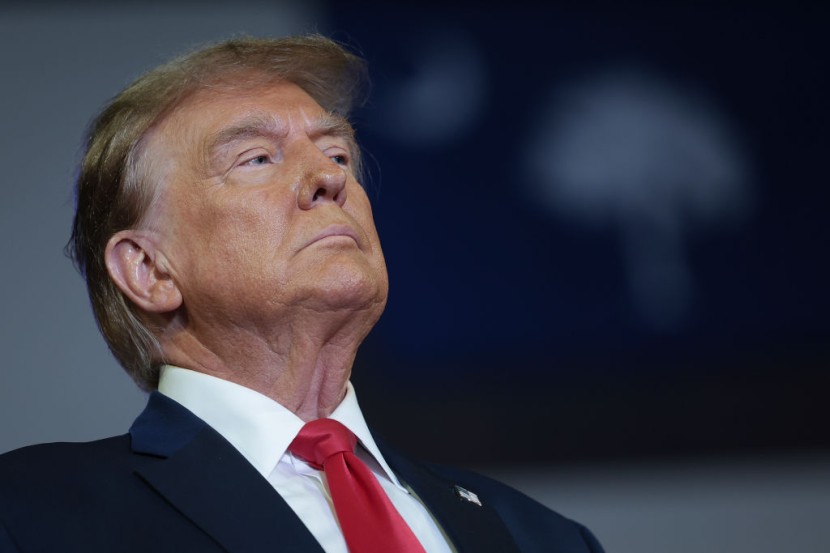
Former President Donald Trump is seeking an extension from the Supreme Court for his election interference trial. He claims immunity from prosecution, arguing that he did not conspire to overturn his 2020 election defeat.
The lawyers swiftly submitted an urgent appeal to the court on Monday, a mere four days after the justices listened to Trump's appeal to stay on the presidential ballot, despite facing opposition due to his actions following his defeat in the 2020 election.
Trump Claims Presidebntial Immunity
A significant criminal trial involving a former president is currently on hold, awaiting a decision from the nation's highest court. The deadline was met to request the intervention of the justices, as set by the federal appeals court in Washington when it dismissed Trump's claims of immunity and allowed the trial to proceed, as per AP News.
The outcome of the Supreme Court's decision and the speed at which it takes action could have a significant impact on whether the leading candidate in the Republican presidential primary will face trial before the November election.
There is currently no set timeline for the court's decision, however, special counsel Jack Smith's team has been advocating for the trial to occur within this year. Trump, on the other hand, has made multiple attempts to postpone the case.
If Trump were to emerge victorious over President Joe Biden, there is a possibility that he might utilize his authority as the leader of the executive branch to direct a new attorney general to dismiss the federal cases against him or even explore the option of seeking a pardon for himself.
The Supreme Court has the option to reject the emergency appeal, allowing US District Judge Tanya Chutkan to resume the trial proceedings in Washington's federal court. The trial was originally set to commence in early March.
Additionally, the court may choose to prolong the delay as it considers the arguments surrounding the immunity matter. Depending on the justices' decision, the schedule they establish will play a crucial role in determining the potential start date of the trial. This will be particularly significant if the justices concur with the lower court rulings that Trump is not exempt from prosecution.
Throughout the past few months, Trump has been pushing for a broad interpretation of executive power, claiming that he is immune from prosecution due to the nature of his duties as president. The three-judge panel at the DC circuit unequivocally dismissed his position.
However, Trump's legal team has consistently seen the immunity matter as a means to delay the trial rather than a valid argument they could prevail on. It was possibly the sole action they could take that prompted an appeal prior to the trial and resulted in an immediate suspension.
Trump had no choice but to take his case directly to the Supreme Court, bypassing any intermediary challenges that could have caused more delays. This decision came after the DC circuit panel set specific guidelines for how Trump could proceed with further appeals if he wanted to keep the case on hold.
According to a source familiar with the matter, John Sauer, who serves as Trump's chief appellate lawyer, prepared the application for a stay over the weekend. The Trump legal team has been expressing concern about whether the Supreme Court would agree to keep the case frozen while Trump makes his final appeal.
Furthermore, even if a stay were to be granted, the ultimate decision of whether the Supreme Court will consider the case remains uncertain. The court's next moves will play a crucial role in determining whether Trump will face trial for federal election interference prior to the 2024 presidential election.
Recent public polls indicate that voters may be more likely to support the Democratic incumbent Joe Biden, who emerged victorious against Trump in 2020, if Trump were to be convicted in this case. If the Supreme Court decides not to hear the case, jurisdiction would be returned to Chutkan in the federal district court in Washington.
Chutkan decided to change the trial date she had originally set for March 4th, but has otherwise demonstrated a strong commitment to moving forward with the trial quickly.
If the Supreme Court agrees to take on the case, the timing of the deadlines, arguments, and ultimately, the decision, will be of utmost importance. As the court's decision approaches the end of its term, the chances of a trial occurring before the election become increasingly slim.
Per The Guardian, the timing of the Supreme Court's proceedings has gained significance due to Chutkan's commitment to provide Trump with the complete seven months to prepare his trial defense, as outlined in her initial scheduling order for the 4 March trial date.
© 2026 HNGN, All rights reserved. Do not reproduce without permission.




